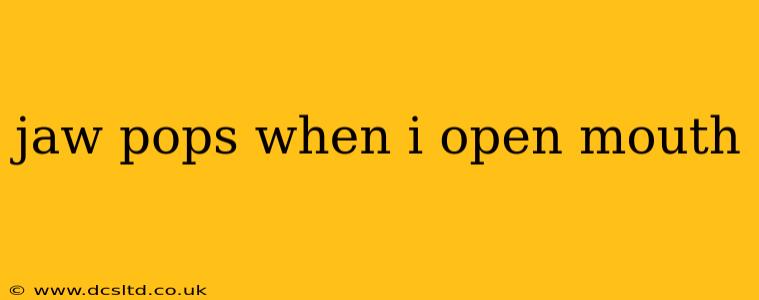Experiencing a popping sound in your jaw when you open your mouth can be concerning. This common issue, often related to the temporomandibular joint (TMJ), can range from a minor annoyance to a significant source of pain and discomfort. Understanding the potential causes, effective treatments, and when to seek professional help is crucial for managing this condition effectively.
What Causes a Popping Jaw?
A popping jaw is frequently linked to problems with the temporomandibular joint (TMJ), the hinge connecting your lower jaw to your skull. Several factors can contribute to this clicking or popping sensation:
-
Temporomandibular Joint Disorders (TMJD): This is the most common cause. TMJD encompasses a range of conditions affecting the TMJ, including disc displacement, inflammation, and arthritis. The popping sound often results from the articular disc—a cartilage cushion between the jaw bones—slipping out of place as the joint moves.
-
Ligament laxity: Loose or overly flexible ligaments supporting the TMJ can allow for excessive movement, leading to the popping sound.
-
Muscle spasms: Tight or spasming jaw muscles can also contribute to jaw popping. This is often linked to stress, clenching, or grinding teeth (bruxism).
-
Arthritis: Degenerative joint diseases like osteoarthritis or rheumatoid arthritis can cause inflammation and damage to the TMJ, resulting in popping and clicking sounds.
-
Injury: A trauma to the jaw, such as a blow to the face or a dislocation, can damage the joint and cause popping.
Why Does My Jaw Pop When I Open My Mouth Wide?
Opening your mouth wide exacerbates the misalignment or dysfunction within the TMJ. The greater the range of motion, the more likely the disc is to slip, causing the popping sound. This is particularly true in cases of disc displacement.
What Happens if My Jaw Pops and Doesn't Hurt?
While a painless popping jaw might seem insignificant, it's still important to pay attention to it. The underlying cause could be progressing, eventually leading to pain, limited range of motion, or other complications. Regular monitoring and potential consultation with a dentist or doctor are advisable.
How Do You Fix a Popping Jaw?
Treatment depends on the underlying cause and severity of the condition. Options include:
-
Conservative Treatments: These are often the first line of defense and may include:
- Over-the-counter pain relievers: Ibuprofen or naproxen can help manage pain and inflammation.
- Heat or ice packs: Applying heat or ice can soothe the affected area.
- Soft food diet: Avoid foods that require excessive jaw movement.
- Stress management techniques: Stress reduction practices like yoga, meditation, or deep breathing can help alleviate muscle tension.
- Mouth guards: A custom-fitted mouth guard can prevent teeth grinding and reduce stress on the TMJ.
- Physical therapy: A physical therapist can teach exercises to improve jaw mobility and strength.
-
More Invasive Treatments: If conservative treatments fail, more involved options might be considered:
- Corticosteroid injections: These injections can reduce inflammation in the TMJ.
- Surgery: In severe cases, surgery may be necessary to repair or replace damaged components of the joint.
When Should I See a Doctor for a Popping Jaw?
Seek professional medical advice if:
- The popping is accompanied by significant pain.
- You experience locking of the jaw (inability to open or close your mouth fully).
- You have limited jaw movement.
- Your symptoms worsen over time.
- You experience facial pain or headaches.
Disclaimer: This information is for general knowledge and does not constitute medical advice. Always consult with a qualified healthcare professional for diagnosis and treatment of any medical condition. Self-treating can be dangerous and delay appropriate care.
